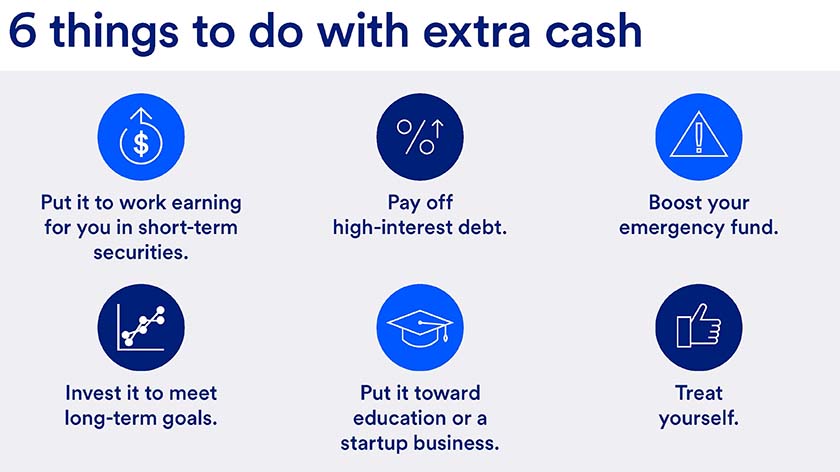Use extra cash to tackle financial goals, like paying off high-interest debt, building an emergency fund, or boosting your investments.
Consider investing in personal or professional growth, whether it’s taking a course, starting a business, or saving for future expenses.
Yes, you can treat yourself, but a better strategy is to put most of it toward long-term financial stability.
An influx of unexpected money opens the door to exciting possibilities, but what's the smartest way to use that extra cash? Whether it’s a tax refund, inheritance, a well-deserved bonus, or just a buildup in your checking account, it can feel tempting to indulge in a splurge. But before you book that Michelin-starred meal or schedule a dream kitchen renovation, it’s worth taking a moment to think strategically.
With careful planning, using this excess money can do more than bring short-term happiness. It could set you on the path to achieving long-term financial goals. While speaking with a financial professional is always a smart step, here are six financially savvy ways to consider putting your extra cash to work.
6 ways to make the most of extra cash
1. Consider timing when putting extra cash to work.
Sometimes, the timing of a cash surplus matters just as much as how you use it. For example, receiving an inheritance during a challenging emotional time might call for a pause to consider your options carefully. Parking your funds temporarily in a money market account or certificate of deposit (CD) can give you space to decide the best course of action.
Planning ahead for significant expenses like annual insurance payments or upcoming tuition bills? Use your extra money to prepay these costs and get ahead of your budget.
Bonuses or graduation gifts are tempting to spend immediately—but taking the time to evaluate your priorities could pay off in the long run.
2. Pay off high-interest debt with extra cash.
It might not feel glamorous, but clearing high-interest debt like credit cards, personal loans, or variable-rate student loans can be a game-changer for your finances. High interest rates can snowball debt quickly, especially in a rising rate environment, gobbling up your resources over time. Paying off these balances can give you peace of mind and free up money for other priorities.
Pro tip: Once your balances are cleared, start paying off any future credit card charges in full each month to avoid accumulating new debt.
3. Build your emergency fund with extra cash.
Life happens, and an emergency fund ensures you're ready for life's curveballs. From unexpected car repairs to medical needs, having three to six months’ worth of living expenses saved can keep you financially stable.
Consider putting your extra cash into a high-yield savings account or money market account. These accounts often offer better interest rates than traditional savings accounts, helping your funds grow while remaining accessible in case of an emergency.
4. Boost your investments with extra cash.
If you’re debt-free and already have savings in place, consider investing your money to potentially grow your wealth over time. Start by increasing contributions to your retirement accounts, like a 401(k), 403(b), or individual retirement account (IRA). Aim to contribute 10–15% of your pre-tax income annually.
Already maxed out your retirement contributions? Look into a health savings account (HSA) or brokerage account to diversify your investment portfolio further. Investing might not provide instant gratification, but it may help secure your financial future.
5. Invest extra cash in yourself.
When it comes to investments, one of the best you can make is in yourself. Use extra cash to pursue a career-enhancing certification, a professional course, or even education for a family member.
Got entrepreneurial goals? This could be the moment to jump start your small business dreams, reducing the need for loans as you get started.
6. Go ahead and treat yourself with extra cash.
Not every dollar has to be earmarked for practical purposes. It’s okay to use some of your extra cash to celebrate or enjoy life’s little joys. The key is balance. Set a portion of your funds aside for something fun, like a weekend getaway or an item you've been eyeing, while channeling the remainder towards more significant goals.
One smart strategy? Deposit your excess money into savings, give yourself a cooling-off period, then decide on a small treat while keeping most of the funds working for you.
Plan ahead and take action
Unexpected cash doesn’t have to mean fleeting joy. With intentional use, it can become a stepping stone toward achieving your financial goals. Whether you’re tackling debt, growing your savings, or treating yourself, having a plan makes all the difference.
Looking for ways to start investing or need help crafting a financial strategy? Learn how we can support you on your financial journey.
Explore more
How to set financial goals
Setting and working toward financial goals becomes easier when you reflect on your intentions.

Our goals-focused approach puts you first.
We can help you identify and prioritize your financial goals and design a plan to work toward them, making adjustments as your needs evolve.



